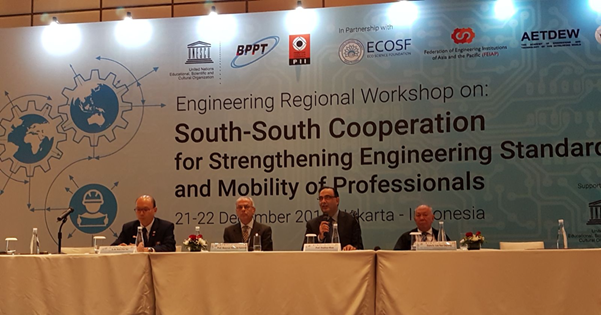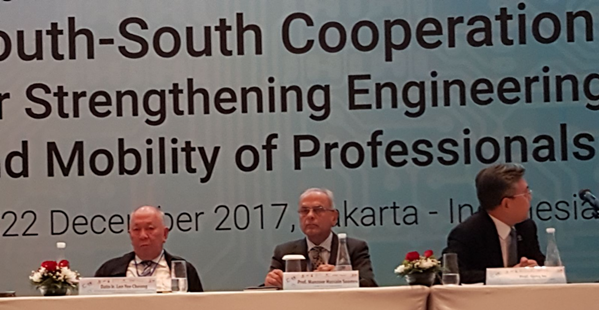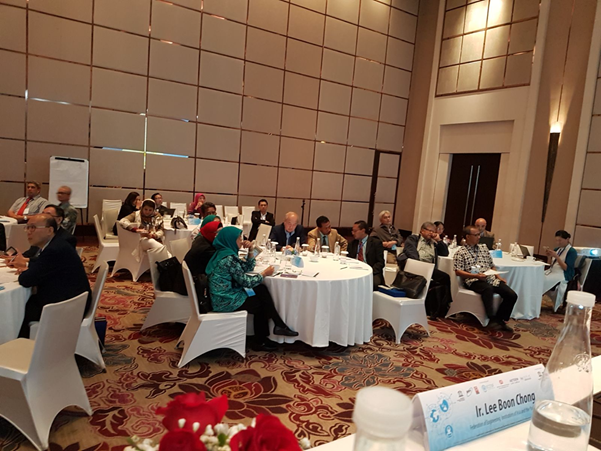UNESCO in Collaboration with ECOSF, AETDEW and Indonesian Institute of Engineering organized the Regional Workshop- “South-South Cooperation for Strengthening Engineering Standards and Mobility of Professionals”
Go Back

UNESCO Regional Sciences Bureau in Asia and the Pacific with support of ECO Science Foundation (ECOSF), Academy of Engineering and Technology of the Developing World (AETDEW), FEIAP and Indonesian Engineering Institution organized the Engineering Regional workshop on “South-South Cooperation for Strengthening Engineering Standards and Mobility of Professionals”. The workshop was held in Jakarta, Indonesia on 21 - 22 December 2017. The aim of this regional workshop was to develop the roadmap between UNESCO, ECOSF, Federation of Engineering Institutions of Asia and Pacific (FEIAP) with partners to enhance engineering qualification, standardization and south-south cooperation; moreover, review engineering, technology, Industry and innovation linkage to create strong sustainable development of engineering in Asia and Pacific region. The workshop discussed the Cooperation among UNESCO, ESCOSF and FEIAP to review the current situation of engineering education and training, through attention to FEIAP standardization for curricula, identify the needs of society and analysis the gap between engineering supply and jobs demand in society to achieve engineering sustainability. The workshop was attended by renowned engineering education experts, heads and leaders of engineering bodies, institutions and academicians. Participation of heads of Engineering Institutions from Myanmar and Timor Leste was also important as they have recently been accredited by the FEIAP. President ECOSF participated in the event and contributed to the technical sessions and made his presentation as one of the key note speakers as well as session chair.
Opening and welcome remarks were presented by Prof. Arief Rahman, Executive Chairman of National Commission of Indonesia for UNESCO, Prof. Shahbaz Khan, Director and Representatives of UNESCO Office Jakarta and H.E. Dato’ Seri Zahrain Mohamed Hashim, Ambassador of Malaysia in Indonesia and various other dignitaries. President ECOSF Prof. Manzoor Soomro, President AETDEW Prof. Lee Yee Cheong and Secretary General of FEIAP also spoke in the inaugural session. From ECO countries professional Engineers from Azerbaijan, Iran, Pakistan and Tajikistan participated on invitation of ECOSF.

Subsequently sessions on different aspects were held. Prof. Dr. Soomro made his presentation in one of the technical sessions on the “ECO Science Foundation (ECOSF) –Promoting Engineering Education Qualification and Standardization in the ECO Region”. Prof. Soomro highlighted the proactive role of the ECOSF for promotion of Science, Engineering, Technology and Innovation in the region. Prof. Soomro said that Engineering practice has societal impacts. Thus there is a need to regulate the practices of engineering to safeguard life and property. He said that regulations of professional engineering practice including international accreditation of engineering qualifications is prerequisite in any country for establishing the competent National Board of Engineers or Engineers Registration Board. Prof. Soomro also appreciated the role of UNESCO and its leadership for their invaluable partnership with ECOSF for promotion of the engineering standardization and accreditation in the region, particularly in the ECO region. He also underscored various strategic and collaborative initiative in partnership with international partners to promote STI in the region.

Workshop comprised of following technical sessions:
Session: Accreditation systems for sustainable engineering standardization
The purpose of this session was to learn from different countries of the status of the accreditation systems for sustainable engineering standardization and accreditation programs in the country.
Session: Development of Young Engineers
The purpose of this session was to discuss how to support young engineers, through institutionalized capacity building, internship training, and technopreneurship programme based on the need and requirement of the different engineering sectors.
Session: Woman in Engineering
The purpose of this session was to develop roadmaps of partnership between UNESCO, ECOSOF and FIEAP to strengthening the role of woman engineers as resource in regional network in the Asia Pacific region, including for certification process of engineering education.
Session: One-Belt-One Road (OBOR) and Engineers
The purpose of this session was to discuss to discuss the opportunities of One-Belt-One Road (OBOR) to strengthen engineering qualification and standardization as well as potential collaboration strategy with particular reference to Infrastructure Development and Maintenance under OBOR, and roadmap of UNESCO, ECOSF, FEIAP and Academy of Engineering and Technology of Developing World (AETDEW).
This session was chaired by Dr. Soomro and the speakers included Dato Lee, Vice President WFEO and the Vice Rector of Tajikistan State Technical University Dushanbe Prof. Momadamon, who emphasized on the importance of B&R initiative of China and standardization of Engineering qualifications.
Session: Building South-South Cooperation in Engineering Qualification
The purpose of this session was to to discuss on how UNESCO and ECOSOF could support the Engineering Qualification and Standardization of FIEAP to promote South-South Cooperation for sustainable engineers’ future in Asia and Pacific region

Outcome of the Workshop:
The workshop provided a roadmap to demonstrate close cooperation between UNESCO, ECOSF based on FEIAP engineering standardization and qualification in partners’ country to sustainability for reviewing the engineering curricula and identifying the status of the accreditation system for sustainable engineering standardization program in Asia Pacific Region and south-south cooperation.
It was agreed in principle to make joint efforts to initiate accreditation process in Azerbaijan, Iran and Tajikistan depending on the level of interest by the relevant authorities of these countries.
Furthermore, it was also a consensus that Chinese authorities be kept on board for support to the program under the “Belt and Road” initiative of China.
UNESCO Regional Science Bureau will finalize the outcome officially and circulate to all parties concerned for further action and follow up.